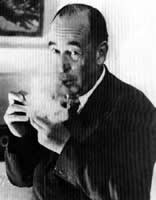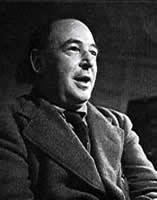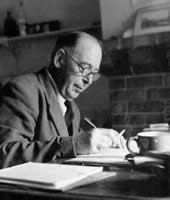Bible | Movies | Books | People | Hot Topics | Holidays | Humor | Gallery | Sanctuary | Sermons | Prayer | Quizzes | Communities | God | FAQ | Links
|
Sponsored Link |
C.S.
Lewis (1898-1963)
One of the most widely respected figures
identified as an evangelical Christian, Lewis was a prolific author, an imaginative
thinker, and a serious scholar whose work sparked the interest of wide audiences
around the world. His writing is enjoyed by children, provokes renewed interest
in Christianity on the part of skeptics and agnostics, and continues to be read
by adults eager for a more robust faith, freed from the stultifying influences
of rigid orthodoxy. Still, the comparison that struck me most powerfully in watching this first Chronicles movie, was with Mel Gibson's The Passion of the Christ. I find it ironic that while Gibson asserts that he is sticking with the literal truth of the gospel, he clearly compresses and distorts its message, while Lewis, in a work of fiction, manages to convey the subtlety of the New Testament faith in ways that are at once more entertaining and more illuminating. Consider this: the focus of Gibson's film is the bloody and agonizing death of one man. Even if the viewer is willing to suspend all disbelief and accept the figure at the center of all the bloodshed as the Son of God, the film conveys one basic message. The death of Jesus was horrible; it was agonizing; it was heart wrenching. It was not, however, any more agonizing that the deaths of tens of thousands of innocent Iraqi citizens in the latest human bloodfest. By contrast, in the Chronicles a far wider range of experience is reflected. The imaginative world of Narnia mirrors both the evil and the good, both the violence and the possibility of redemption, both the beauty and the color of the world we all inhabit if we only look behind the curtain of our own adult consciousness and see the grace that lies within. For more movie reviews on this site Who Was C. S. Lewis? C.S. Lewis [Clive Staples Lewis] British scholar, novelist, and author of about 40 books, most of them on Christian apologetics, the most widely known being The Screwtape Letters. He also achieved fame with a trilogy of science-fiction novels and with the Chronicles of Narnia, a series of seven children's books that have become classics of fantasy literature. During World War I, Lewis fought in France with the Somerset Light Infantry and was wounded in 1917. The following year he went to University College, Oxford, where he achieved an outstanding record as a classical scholar. From 1925 to 1954 he was a fellow and tutor of Magdalen College, Oxford, and from 1954 to 1963 he was professor of medieval and Renaissance English at the University of Cambridge. Lewis lapsed into atheism in his teens but experienced a reconversion to Christianity in 1931. His first work to attract attention was The Pilgrim's Regress: An Allegorical Apology for Christianity, Reason and Romanticism (1933). In 1936 came the critical and characteristic Allegory of Love: A Study in Medieval Tradition, considered by many to be his finest scholarly work. The first of his science fiction novels (a genre then scarcely known), Out of the Silent Planet (1938), was followed by the equally remarkable fictions Perelandra (1943) and That Hideous Strength (1945). These three books, which form one of the best of all science fiction trilogies, canter on an English linguist named Ransom who voyages to Mars and Venus and becomes involved in a cosmic struggle between good and evil in the solar system. Lewis'
The Problem of Pain (1940) brought him wide recognition as a lay expositor
of Christian apologetics, but it was far exceeded by the fictional best-selling
Screwtape Letters (1942). This satire consists of 31 letters in which
an elderly, experienced devil named Screwtape instructs his junior, Wormwood,
in the subtle art of tempting a young Christian convert. Lewis' first story for
children was The Lion, the Witch and the Wardrobe (1950), the first of
seven tales about the kingdom of Narnia. The Narnia books are exciting, often
humorous, inventive, and, in the final scenes of The Last Battle (1956),
deeply moving. Notable among Lewis' other books are a volume of autobiography,
Surprised by Joy; The Shape of My Early Life (1955), and a novel based
on the story of Psyche and Cupid, Till We Have Faces: A Myth Retold (1956). From
Encyclopedia Britannica Premium Service (2005). Text � Encyclopedia Britannica,
Inc. Lewis, Clive Staples (1898-1963). British scholar of English literature, writer and Christian apologist. As an Oxford don in the 1920s, C. S. Lewis moved from atheism to committed Christianity, specifically to an evangelical Anglicanism. His most popular Christian works are The Screwtape Letters (1942), relating the advice given by a senior devil to his subordinate in luring a human subject away from salvation; Mere Christianity (1952, but originally a series of radio talks begun in 1941); and his spiritual autobiography Surprised by Joy. A science-fiction trilogy (1938-45) and the seven children's books known as the Chronicles of Narnia (1950-6) incorporate Christian themes allegorically. The death of his wife, Joy Davidson, evoked the searching record of his grief, A Grief Observed (first published under the name N. W. Clerk). From John Bowker, ed., The Concise Oxford Dictionary of World Religions
Please take a moment to let us know you
were here!
If you want to talk with someone in person, please feel free to call 917-439-2305
The Rev. Charles P. Henderson is a Presbyterian minister and is the author of God and Science (John Knox Press, 1986). Charles also tracks the boundry between the virtual and the real at his blog: Next World Design, focusing on the mediation of art, science and spirituality in the metaverse. For more information about Charles Henderson. |
Sponsored Link
|




